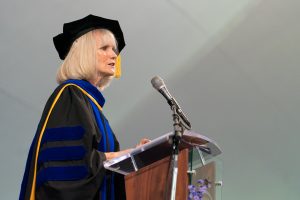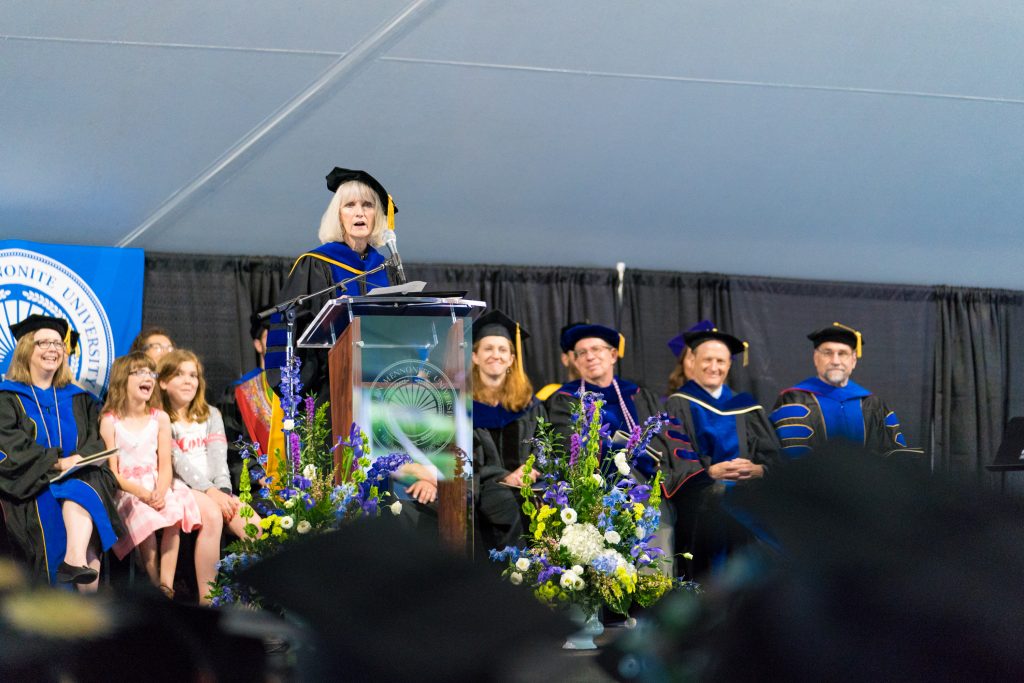Judy H. Mullet, professor of psychology at Eastern Mennonite University, provided the address for EMU’s 101st commencement on Sunday, May 5, 2019.
Mullet, who retires this year, earned her bachelor’s degree in psychology from EMU in 1973, a master’s in education degree in school psychology from James Madison University, and a PhD in special education from Kent State University.
In addition to teaching psychology and teacher education at EMU, she directed the Honors program, and co-founded and co-led Student Kairos Place, a gathering of EMU undergraduate writers.
Her prepared commencement remarks:
Mmmm…
Mmmm… I am deeply honored to be here with you: graduates, families, friends, faculty, staff, administrators, well-wishers and those here in spirit.
Now it’s your turn, graduates. Raise your hand if this describes you: I have finished or will be finishing my degree or certificate program in one or two years at EMU. Three years? Four to five years? Thirty two years? That’s me! Yes, I’m “graduating” not last, but at last, with your 2019 class. Now doesn’t that make you feel gifted?!!! Feel free to mmmm whenever you feel like it.
Today, I represent the past. You as graduates are the present. Let’s look now to the future: Raise your hand if you are eight, nine or 10 years old? There’s an empty seat on the platform here – would one of you like to sit in it until I’m done speaking? Come on down!
Graduates and esteemed guests, please welcome the year 2060 president of EMU. To the future president: Meet your current president, Susan Schultz Huxman. Look at this crowd. Nice view, huh? Please enjoy your 10 minutes of fame – it will pass quickly. I look forward to seeing more of you in the future.

I believe a worthy education is bidirectional and happens in conversation across generations. No one gets here alone or without the support of others. For example, someone transported that chair from storage, placed it in a spot that someone else had already mowed, and wiped it down. Let’s move even farther back in time with your chair: Before this moment, someone shipped it, painted it, supervised the factories making and assembling the chair, and mined the raw materials that were forged by time and weather. The chair – from my perspective – exists through the spark of the divine presence among us.
Enough about your chair. We could turn next to your graduation hat, or even the pillow you slept on last night, and chart a similar trail. And think of persons in your past who continue to influence you. The ancestor effect was identified in a series of three studies that asked students who were about to take a test to imagine their grandparents or 15th century ancestors – you had them or you wouldn’t be here – whispering encouragement into their ears. Those listening to the past did better on the test than those who just imagined a friend whispering encouragement. And would you be here without the discovery of antibiotics or vaccines? Or, whose actions contribute to the quality of the air you breathe, the life-giving vegetation around you, or that precious bottle of clean water under your seat? Can you see how endless this exploration could be?
I haven’t even touched on what could’ve happened today and didn’t. You could be suffering from food poisoning from a meal last night, or a rainstorm could have blown down this tent, or bed bugs are already in your suitcase… I hear a different kind of mmmm, after that thought.
In the end, we have done very little compared to what others have done for us. Faith writer Diana Butler Bass says, “We don’t achieve, we receive.” What? “We don’t achieve, we receive.” Isn’t this ceremony a celebration of your achievements? Yes, and much more. But imagine what you have received in order to be here today. Hold that thought.
Now let’s transition ever so awkwardly to another question for you: What three-word sentence has been heard by almost everyone here, and in 141 other countries, too? Anyone?
I’ll tell you, but first you must imagine me as a big blue furry animal. Listen closely: “Me want cookie.” Yes, sadly, Cookie Monster’s words from Sesame Street have been heard round the world. Yet worries about the obesity crisis and society’s failure to sacrifice now to save the future prompted Sesame Street creators to make changes. In 2013 another phrase was added: “Me want cookie, but me wait.”
That worry – that people are detrimentally failing to delay gratification – spawned oodles of self-help books exploring the two “G’s” of grit and growth to improve self-control through effort, mental toughness, visualizing goals, creating bucket lists and vision boards.
But along with grit and growth, there’s a third “G.”
David DeSteno, research psychology professor at Northeastern University, notes that most strategies designed to teach self-control are primarily cognitive-based. He agrees that such strategies can produce worthy results, but he provides empirical evidence for another route for valuing and contributing to the future – a route that focuses on the relationship between self and other for social living. He researches that third “G”: Gratitude. This gratitude is a “state of quiet power,” the “moral memory” of humanity, and it moves us to action: to help others, to make healthy decisions, to persist in tough situations.
In her 2018 book on gratitude, Diana Butler Bass speaks to transformational gratitude that comes only through a relationship with God and creation. This deep gratitude is not cheap gratitude, not prosperity gratitude, not quid pro quo or obligatory gratitude. Instead, it’s a gratitude that is both personal and public, one that actively resists evil. It’s recognizing that we don’t achieve; we receive … and we pass it on. It’s an ethic, a state of being, and a trait. Cicero called gratitude the parent of all other virtues.
Certainly gratitude begins with manners, but it grows with practice and awareness to where we truly realize, with Bass, that “all gifts exist before we give them.” Gratitude itself is a gift, if we choose to receive it. Einstein tells us, “You have two choices in life: You can live life as if there are no miracles, or you can live life as if everything is a miracle.” Your choice: Will you close your eyes to the gifts around you, or will you choose what you may have heard in Sunday School, “In everything give thanks” (1 Thessalonians 5:18).
In the final period of my Interpersonal Relationships class, I show one slide that asks students to read and follow these instructions: “You have 3 minutes. Go find wisdom. Bring it back to class.” I get quizzical looks, and someone invariably asks for clarification, but I give none – and in just three minutes they come back with wisdom. They will bring an idea from a book or pamphlet, words from a conversation they heard in the hallway, a metaphor or even a person. And now that wisdom is theirs – to pass on. Wisdom is around us all the time. “All gifts exit before we give them.” Mmmm.
We belong to something larger, bigger than we can imagine, and this “consciousness of source” inspires grateful living. So now we’ve circled back to what you’ve heard from EMU from the get-go and even last night in baccalaureate – Micah 6:8: “I have told you what is good. Do justice, love mercy, walk humbly with God.” I say, there can be no justice or kindness without gratitude. And gratitude is the only route to humility that I know.
Micah 6:8 calls us to be both fierce and gentle, bold and vulnerable, merciful and accountable, to forgive and be forgiven, to take on Capitol Hill and to live in the gutter, to stand on a soap box and to fall to our knees – but always with the knowledge of where we come from and who we come from and to whom we are going.
Gratitude is the only soul-worthy response to the endless gifts given to us. We receive the chair, our ancestors, antibiotics, the water bottle under our chairs, the non-poisoned food, and every gift we enjoy today. Words aren’t enough. An mmmm is needed.
When our family moved to Harrisonburg in 1986, we visited a number of churches. The one we still attend, through thick and thin, is the one that taught me to mmmm. When someone announced their engagement or new birth, an mmmm would ripple through the crowd. The same mmmm, but with a different tone, could be heard when someone shared a trial or loss. I called it “our mmmm church.” Wordless sounds, humming, come from the heart and are there when words fail, when gratitude is among us – and when it seems far away.
A now a final glimpse of gratitude that I can only imagine: In the Boston Market there’s a monument engraved with the story about a child living in the shadow of death in a concentration camp. As she walked to her assigned work early one morning, as she ventured through the mist, she noticed a single raspberry peeking out from behind a rock. She tenderly plucked it, wrapped it gently in a leaf, and put it tenderly into her pocket. She guarded that raspberry all day, and in the evening she tiredly but eagerly returned to greet her only friend. With shining eyes she reached into her pocket, took out the raspberry and gave it to her friend. And her friend – the only one who survived that camp – later wrote, “Imagine a world where the only thing you have is a raspberry, and you give it to a friend.”
“Imagine a world.”
Mmmmm.
